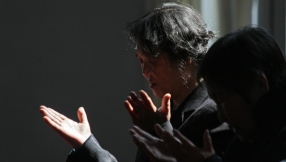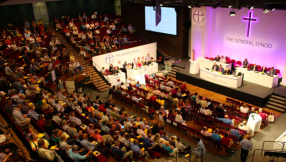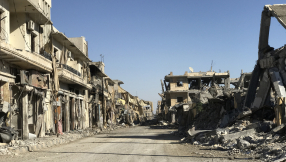Japan Primate's Message of Peace, Prime Minister Apologises for War Atrocities
The peace message was in part an admission of the Church’s failure in upholding the teachings of Christ in the face of Japan’s war campaign, which began at the start of the Meiji Restoration in 1868: “Throughout the unfolding history of modern Japan, we in the NSKK failed to stand up for the gospel of the boundless love of God for every human life as revealed in our Lord Jesus Christ, and lacked the courage to stand up in opposition to the war.”
The message continued: “Furthermore, we were not able to prevent the many forms of victimisation nor the taking of life, either abroad or at home.”
This admission of failure was a reiteration of the Statement on War Responsibility of Nippon Sei Ko Kai, adopted at the 49th General Synod in 1996, following the 1995 NSKK Mission Consultation, which acknowledged the Church’s failings.
The reverend’s message also expressed concern at the trend in defence policy since the end of the Cold War and, it said, especially since the 1991 Gulf War. Rev Turo Uno was referring to a number of defence bills, whose constitutionality have come into question.
“It is our sense that powerful forces are at work to change Japan from a country with a “Peace Constitution” into a nation which is once again capable of waging war,” the statement read.
Rev Turo Uno also criticised Japan’s recent involvement in the Iraq conflict. He continued: “In fact, under the rubric of so-called 'recover support', Japan’s Self-Defense Forces have been deployed to Iraq. Even the revision of the country’s 'Peace Constitution' is on the agenda of some politicians.”
The peace message comes at the same time as Japanese Prime Minister Junichiro Koizumi’s apology for Japan’s wartime aggression and attempts to colonise other countries in Asia.
Mr Koizumi expressed his “deep reflections and heartfelt remorse” for the damages caused by Japan and pledged that the country would never forget the “terrible lessons” of the war.
The statement read: “Our country has caused great damages and pain to people in many countries, especially our Asia neighbours, through colonisation and invasion.”
Rev Turo Uno said that through the “horrible experience” of ground warfare in Okinawa, as well as the subsequent hardships in the face of American military bases positioned there, had allowed Japan to “understand the horror of war and immeasurable value of peace”.
As a result the NSKK has made it a point to strengthen ties with other churches in Asia in order to learn from them. He said: “Fellowship with these Churches enables us to more clearly perceive our past errors in Japan, and motivates us to discover ways of living in Christ.
“With Christ, we seek to form relationships with the weak and marginalised in society, and through such relationships to build a society in which all people can live together and share one another’s joys and trials.”
The statement reiterated the determination of the NSKK to continue its opposition work against a revision of Article 9 of the Constitution, in which Japan renounces war and the use of military force, as concluded at the 55th General Synod in 2004.
The statement read: “All of us who belong to the NSKK will join in prayer that we may all be made into peacemakers and receive the promised joy of our Lord.”













